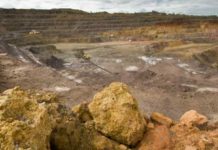
[miningmx.com] — THE amended Mineral and Petroleum Resources Development Act (MPRDA) would make provision for the partitioning of mineral rights, allowing for the sub-division and sale of portions of a right, Mines Minister Susan Shabangu said on Thursday.
Shabangu, who addressed a Commonwealth Business Forum round table discussion in Perth, said the proposed change formed part of the ongoing review of the MPRDA, intended to improve and simplify the regulation of mining in South Africa.
“This will introduce changes like.the concept of the partitioning of rights, a development which has long been awaited by the mining industry,’ said Shabangu. “In terms of the proposed changes, holders of rights will be entitled to subdivide the right and dispose of a portion of the same after following due process.’
Mineral rights granted by the Department of Mineral Resources (DMR) often cover two or more portions of land. It is often necessary that such a right be sub-divided; particularly where it involves neighbouring miners who – due to the geological characteristics of the orebody or other operational synergies – can make better use of a portion of land over which the right extends.
Bruce Dickinson, partner at law firm WebberWentzel, said the MPRDA in its existing form did not cater for partitioning.
“There is no express mechanism in the current MPRDA in terms of which the holder of a prospecting right could, for example, subdivide the right and dispose of it to a third party or swap it for a portion of another right,” said Dickinson. “Everyone has been making-up their own way to deal with the problem.”
According to Allan Reid, a director at law firm DLA Cliffe Dekker Hofmeyr, many large and complex transactions cannot be implemented as the sub-division or partitioning of rights and the subsequent registration thereof are being refused by the DMR.
“Where consent for such sub-division has been accepted, the registration office is refusing to register such sub-division,’ he said.
He said the only workable way to achieve a sub-division, at the moment, involved an approach in terms of three different sections (56, 102 and 43)of the act, whereby the “seller’ would conditionally abandon a portion of its right and the “buyer’ apply for the transfer of the right. In addition, the transfer of the environmental liabilities would involve an additional application.
Reid said this complicated process has added to uncertainty and had contributed to the perception that South Africa’s mining industry was stifled by over-regulation and the inappropriate interpretation of mining legislation.
RIGHT SUSPENSIONS
Shabangu also told her audience that the temporary closures of operations would only occur as a last resort if the DMR’s “attempts at correction’ fails.
“We will tread very carefully with these issues because we are very much aware of the link between the need for private companies, on the one hand, to make their margins and the need for the DMR, on the other hand, to ensure that there is compliance with our country’s laws.
“In the event of non-compliance with, for instance, environmental management plans and mining works programmes, we will then throw the book at these entities in a bid to promote responsible mining.’
She also said mining companies should take their involvement with local communities seriously. Operations at ASX-listed Platinum Australia’s Smokey Hills platinum mine in Limpopo, for instance, were suspended for almost a week in July, allegedly for failing to implement its Social Labour Plan.
This incident was followed by another production outage at the mine in September, after community members in the area had blocked the access road to the mine.
“Tensions between communities and mining companies must be resolved as a matter of top priority, with full consideration for the welfare of the communities and workers,’ said Shabangu.
“Despite their contribution to foreign exchange earnings and taxes, these companies need to continue to work with us to give effect to the reasonable targets that are spelled out in our mining charter.
“These are not luxuries; they are a critical part of our attempts to right the wrongs of the past.’










